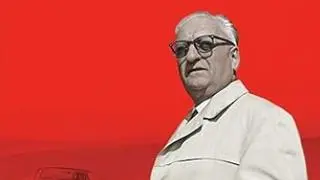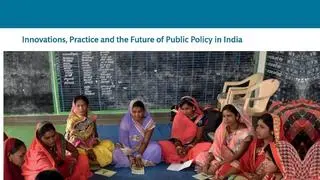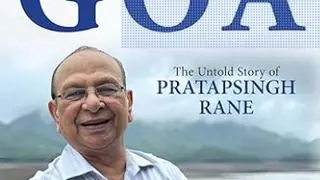He was an actor who could cast a spell on you through the various characters that he portrayed on the screen. He was no different in real life. Haribhai Jariwala, better known as Sanjeev Kumar, was not an enigma like Guru Dutt, but he was not someone well understood by the industry of filmmakers either. Sanjeev Kumar was a self-made actor, who would happily accept roles that many dreaded even thinking of enacting.
In a new book on the accomplished actor, who died at the age of 47 in 1985, authors Reeta Ramamurthy Gupta and Uday Jariwala bring to light hitherto unknown facts about the man to give us a gripping book.
“I had a feeling that I was unravelling a mystery as I wrote the book,” said Gupta. “One of my greatest beliefs is in the power of languages. So I looked beyond the trademark Hindi and English articles and studied over 800 magazine articles in five languages, including Gujarati, Tamil, and Bengali, to write this book.”
She adds, “Gujarati because Gujarat was his home State. Tamil, because other than Sanjeev Kumar's friendship with Sivaji Ganesan, many southern directors like LV Prasad loved working with him. Bengali because most of his co-actors and a clutch of his directors were Bengali, think Jaya Bhaduri, Sharmila Tagore.”
Delivering a dialogue with an impactful punch was Sanjeev Kumar’s strength. He was never accused of imitating any other actor and that was a tribute to his awesome talent. “Once I got a framework of how Sanjeev Kumar spoke, the words and phrases he used, and the persona that was being captured, I crafted a timeline and a skeleton. The flesh had to come from those who knew him. So, the book has over 25 interviews with co-actors and friends, who chipped in willingly close to 40 years after his death. The final layers were added by his immediate family, viz my co-author Uday, Sanjeev Kumar's sister Gayatri Patel who expired in 2021, and Uday's mother Jyoti Jariwala,” Gupta says.
Paresh Rawal’s foreword
Uday runs the Sanjeev Kumar Foundation, an NGO that works towards the promotion of theatre, art, and education. Gupta is a busy biographer and reviewer for CNBC TV18 and a bibliophile. The book, published by Harper Collins, has a moving foreword by famed actor Paresh Rawal. “When the Almighty decided to bless Hindi cinema with largesse, he sent Haribhai Jariwala to earth. A parasmani who could deliver a stellar performance in a simple role or convert an ordinary dialogue into an auditory odyssey, Haribhai Jariwala was a performer nonpareil,” he says.
The book is replete with anecdotes narrated in a lucid style. “I think somewhere, in the middle of writing this book, I realised that if I kept my own opinions out of it, then Sanjeev Kumar's pure story could serve many readers. For example; when he was young, his mother was in debt; but he wanted to make it as an actor. This can be a difficult thing to do. But he persevered; after 14 years of struggle, he saw 14 years of dizzying success,” write the authors.
“Professionally, he took incredible risks, attempting all kinds of roles and never getting slotted. And even at the height of his success, he was generous to a fault. He gave money to anyone who needed it — whether they were his friends or someone who wanted to make a film but didn't have the money to. Personally, when he knew he was approaching his end; he wrote a will and secured the future of his brother’s family. He was a rare man who cared deeply and achieved incredible success,” Gupta brings out this personal aspect of his life.
For all his skills at playing any role, against stalwarts like Dilip Kumar, Amitabh Bachchan, Dharmendra, and Sanjeev Kumar did not get the recognition and stature he deserved.
“This is very subjective. When our own Oscar-winning filmmaker Satyajit Ray decided to make his first Hindi film, he wanted to cast two people — Sir Richard Attenborough and Sanjeev Kumar. Ray’s 1977 film titled ‘The Chess Players’ is set in 19th century Lucknow. Two lazy noblemen are foolishly obsessed with chess even as the British want to usurp their territory. Such was the power of Sanjeev Kumar and Saeed Jaffrey’s performance and Ray’s direction, that the film became India’s official entry to the 51st Academy Awards for Best Foreign Language Film,” says Gupta.
Gupta writes glowingly about The Chess Players (Shatranj Ke Khiladi). “The film was received and reviewed globally. It is one of the ‘Forty Films that Martin Scorsese wants you to see.'"
There are sections of the book where the storytellers seek information from those who knew Sanjeev Kumar personally. His heartbreaks with Nutan, Hema Malini and Sulakshana Pandit are scripted authentically. At one stage, in 1978, Sanjeev Kumar told Manala Chandran from Film World, “I don’t have the urge any longer to get married. In fact, marriage is an obsolete word.”
Sanjeev Kumar had his own brand of ‘Stage Shows’ that was dialogue based and ran to packed houses in Los Angeles, Toronto, London, etc. His films remain eternal favourites of ardent cinema loves across the world and students of acting study them, hoping to learn.
When Anil Kapoor launched the book in Mumbai, on Sanjeev Kumar's birthday, he said, "I’m sitting here because of Sanjeev Kumar. He has the adulation of his peers and the love of his family. That's a lot.” The book is a welcome addition to the literature on Sanjeev Kumar. It does justice to the man and endears him to his legions of fans across the world.
Check out the book on Amazon.
(Vijay Lokapally is an independent journalist and author)










Comments
Comments have to be in English, and in full sentences. They cannot be abusive or personal. Please abide by our community guidelines for posting your comments.
We have migrated to a new commenting platform. If you are already a registered user of TheHindu Businessline and logged in, you may continue to engage with our articles. If you do not have an account please register and login to post comments. Users can access their older comments by logging into their accounts on Vuukle.